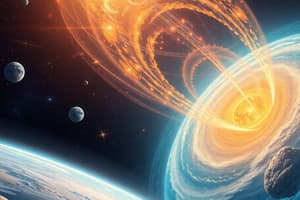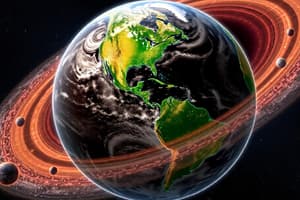Podcast
Questions and Answers
What is the estimated age of the Universe?
What is the estimated age of the Universe?
- 10 Billion years old
- 13.8 Billion years old (correct)
- 16 Billion years old
- 12.3 Billion years old
How old is Earth estimated to be?
How old is Earth estimated to be?
- 4.5 billion years old (correct)
- 6 billion years old
- 450 million years old
- 7 billion years old
Who was the first human to travel into space?
Who was the first human to travel into space?
- Edwin Hubble
- Neil Armstrong
- Yuri Gagarin (correct)
- Alexei Leonov
What are comets mostly composed of?
What are comets mostly composed of?
Which is the most distant object visible to the naked eye?
Which is the most distant object visible to the naked eye?
Which planet is closest to the Sun?
Which planet is closest to the Sun?
What differentiates Earth from other planets in the solar system?
What differentiates Earth from other planets in the solar system?
What theory explains the origin of the solar system and universe?
What theory explains the origin of the solar system and universe?
What occurs if the average density of matter in the Universe is sufficiently high?
What occurs if the average density of matter in the Universe is sufficiently high?
What characterizes the solar system?
What characterizes the solar system?
Which model suggests that the Earth is at the center of the Solar System?
Which model suggests that the Earth is at the center of the Solar System?
According to Copernicus, which celestial body is at the center of the Solar System?
According to Copernicus, which celestial body is at the center of the Solar System?
What does Buffon’s Collision Theory suggest about the formation of planets?
What does Buffon’s Collision Theory suggest about the formation of planets?
What theory explains the formation of the solar system as the result of a gas and dust cloud condensation?
What theory explains the formation of the solar system as the result of a gas and dust cloud condensation?
Which component is believed to have triggered the collapse of the hydrogen gas and dust cloud in the Solar Nebular Theory?
Which component is believed to have triggered the collapse of the hydrogen gas and dust cloud in the Solar Nebular Theory?
How old is the solar system estimated to be?
How old is the solar system estimated to be?
How many moons does Uranus have?
How many moons does Uranus have?
What is the Sun mainly made from?
What is the Sun mainly made from?
How long does it take for sunlight to reach Earth?
How long does it take for sunlight to reach Earth?
Where is the Asteroid Belt located?
Where is the Asteroid Belt located?
What is the estimated age of the universe?
What is the estimated age of the universe?
What percentage of the universe is composed of normal matter?
What percentage of the universe is composed of normal matter?
What study focuses on the origin of the universe?
What study focuses on the origin of the universe?
What percentage of the universe is considered dark energy?
What percentage of the universe is considered dark energy?
Flashcards are hidden until you start studying
Study Notes
Universe Overview
- The universe encompasses all matter, energy, planets, stars, galaxies, and space.
- Cosmology is the scientific study of the universe's origin.
Age of the Universe
- The universe is estimated to be approximately 13.8 billion years old.
- Age determination methods include estimating the oldest star and measuring the universe's expansion rate.
Composition of the Universe
- Composed of 5% normal matter, 25% dark matter, and 70% dark energy.
- Normal matter forms stars and planets; dark matter doesn't emit light and dark energy drives expansion.
- In a closed universe scenario, sufficient matter density could halt expansion, leading to a contraction and eventual collapse.
Solar System Overview
- The solar system includes all celestial bodies orbiting the Sun, located in the Milky Way Galaxy, and is about 4.6 billion years old.
Geocentric and Heliocentric Models
- Geocentric Model: Proposed by Ptolemy, suggesting Earth is the center of the solar system, with the Sun and planets orbiting it.
- Heliocentric Model: Introduced by Copernicus, positing that the Sun is the center, and planets, including Earth, orbit around it.
Theories on the Origin of the Solar System
- Buffon’s Collision Theory: Claims planets formed from debris generated by a collision between the Sun and a giant comet.
- Solar Nebular Theory: Suggests formation from a hydrogen gas and dust cloud that collapsed, potentially triggered by a supernova explosion, resulting in the Sun and planets.
Earth and Its Uniqueness
- Earth is the only known planet in our solar system with conditions suitable for supporting life, emphasizing its uniqueness in the universe.
Studying That Suits You
Use AI to generate personalized quizzes and flashcards to suit your learning preferences.



